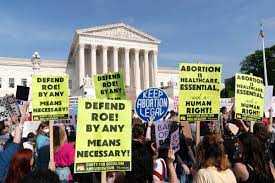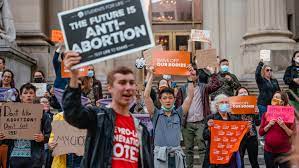The Newly Raised Question of Roe v. Wade

May 13, 2022
On January 22, 1973, the U.S. Supreme Court voted in favor of Jane Roe in the Roe v. Wade case. This case was started when a Texas law made it illegal to have an abortion. Jane argued that the Due Process Clause in the 14th Amendment protected a women’s “right to privacy” to decide whether or not to have an abortion. The conclusion made it so that states were only allowed to regulate or prohibit abortions in the third trimester. From that day on, the debate over abortion has been ongoing. You have people from both sides saying, “My body my choice” or saying “life begins at conception.”
Supreme Court Justice Samuel Alito explains that abortion is not protected by the Constitution seeing as there is no mention of abortion. We have interpreted the 14th amendment to protect rights that have been deeply rooted in American tr adition, but there was no support to make abortion a constitutional right up until later in the 20th century. Three-fourths of the states outlawed abortion prior to adopting this into the 14th amendment.
adition, but there was no support to make abortion a constitutional right up until later in the 20th century. Three-fourths of the states outlawed abortion prior to adopting this into the 14th amendment.
On May 2nd, Politico leaked a draft of the U.S. Supreme Court opinion of the potential overturning of Roe v. Wade that was confirmed in its authenticity. The draft stated that as of now, they are in favor of overturning Roe v. Wade, but many commented saying that this does not represent the final decision, or the opinion of the full court. This lead to a break out of protests from both pro-lifers, and pro-choicers. In a reaction to this leak, U.S. representative, Adam Schiff, suggests that if Roe was overturned, Congress would make a law to legalize abortion nationwide and they would pack the court with liberal justices. He says, “What I care about is that a small number of conservative justices, who lied about their plans to the Senate, intend to deprive millions of women of reproductive care, codifying Roe isn’t enough. We must expand the court.”
If Roe v. Wade is overturned, it is expected that up to 26 states with impose new limits to abortion, and many of these states have ‘trigger laws’ ready for when the ruling is released. Joe Biden has said, “a woman’s right to choose is fundamental” and that his administration “will be ready when any ruling is issued.” If Roe v. Wade is overturned, this won’t go as far as making abortion illegal. Instead, it will make the individual states decision to create limitations on abortion, make it illegal, or keep it legal. We see people from both sides making preparations for whether or not it is overturned, so it will be interesting to see where our country goes from here.











Scott Kirkpatrick • May 16, 2022 at 1:57 pm
Thanks for the article. I appreciate how you made the issues involved easy to understand and highlighted potential next steps!